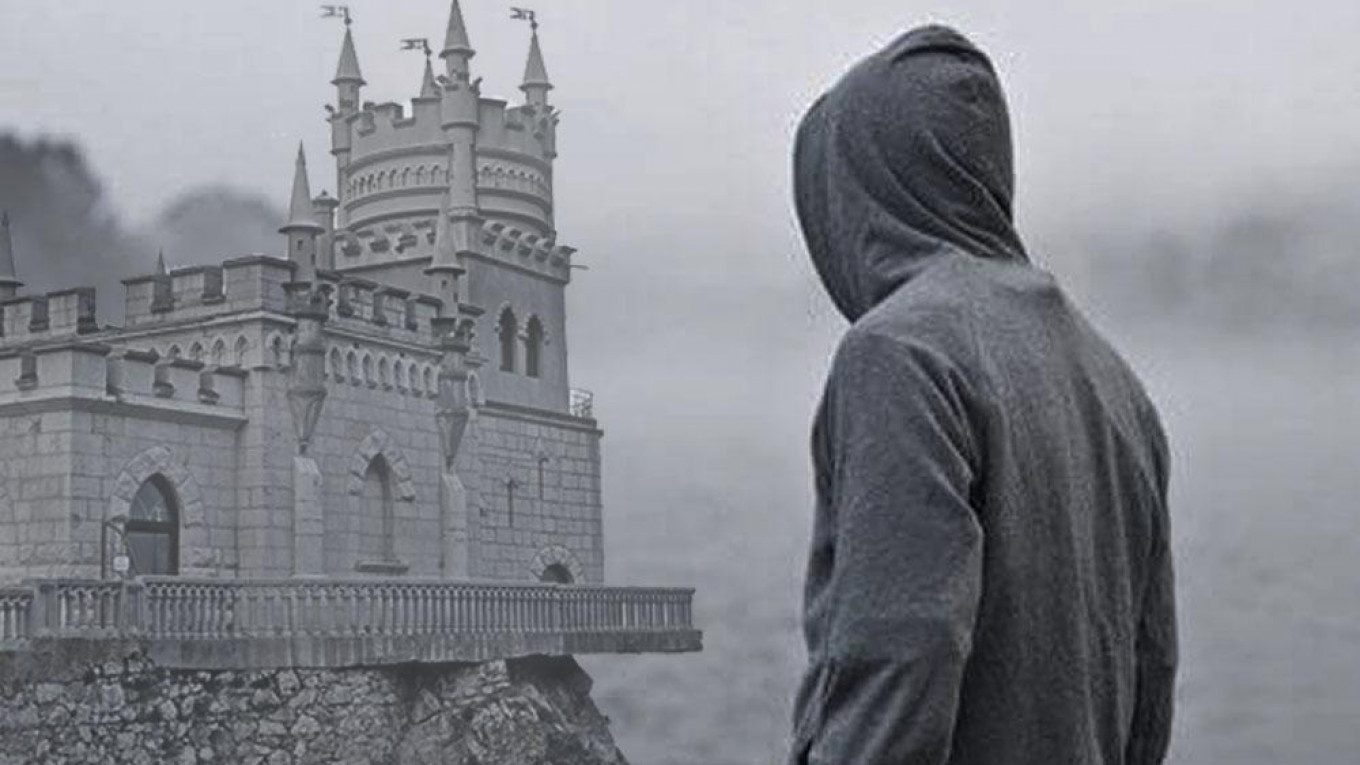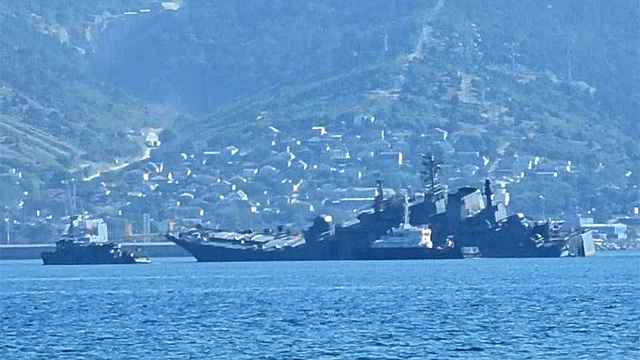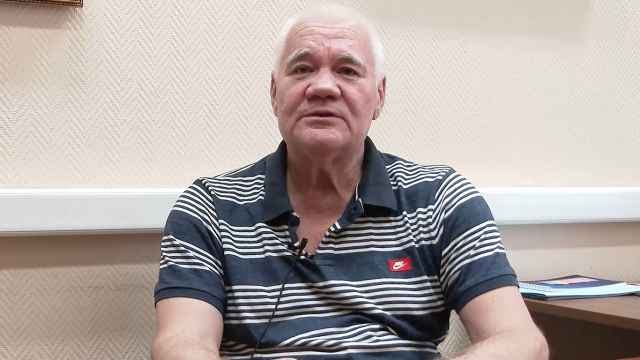Georgy’s drug addiction started when he was just 15.
It began with the painkillers doctors gave him after he fractured his hip. But tension at home made it difficult to stop and the habit spiraled beyond his control.
“When my prescription ran out,” he says, “I started to buy soft drugs on the street. By the time I was 21, I was hooked on heroin.” Soon, he was making his own heroin at home.
In 2008, eight years into his addiction, doctors told him he had one year left to live and Georgy realized he needed help. He began a drug substitution therapy called OAT to safely wean himself off drugs.
At that point, Crimea, where Georgy lived, was still part of Ukraine and substitution therapy (OAT) was legal. But when Russia annexed Crimea in March 2014, the peninsula’s new leadership announced the therapy would be banned.
By May that year, more than 800 drug users who had been receiving OAT, including Georgy, found themselves cut off from treatment. Now local and international rights groups say the ban is fueling a resurgent HIV epidemic with fatal consequences.
“When I started OAT, my life became manageable,” Georgy, now 33, says. “I could work, I gained self-confidence and I stopped associating with criminals. If it weren’t for OAT, I wouldn’t be alive.”
'Painful situation'
Backed by the World Health Organization (WHO) and used in over 60 countries, OAT replaces street narcotics with methadone or buprenorphine, which are less potent and longer lasting. It is widely considered to be one of the most effective methods of reducing opioid misuse and preventing HIV.
Centers where patients received daily treatment and had access to social and counseling services operated in cities across Crimea for nine years before the annexation.
The impact of the ban on Crimeans has been dramatic, local and international rights groups say. According to United Nations statistics, up to 120 patients have died from suicide, overdoses, or complications related to HIV and tuberculosis, as a result of being cut off from medication to suppress the viruses.
Another 14,000 Crimeans, who were covered by HIV prevention services, like needle exchanges, have also been cut off from treatment, according to the Alliance for Public Health in Ukraine, an NGO dedicated to issues around HIV and AIDS.
“Most OAT patients have reverted to street drugs like ‘krokodil’ and some have been put in prison,” Pavlo Skala, Associate Director at the Alliance for Public Health, told The Moscow Times.
“Many HIV-positive patients lost touch with the health care system and came back to hospitals in a terminal phase,” he says. “The situation is painful.”
Western consensus
Ajay Manhapara, a research scientist at Yale University, argues that quitting heroin without OAT is “dangerous.”
Krokodil, the cheap heroin substitute that rights groups say is sweeping Crimea, is a deadly black-market drug. Poorly made, it can cause giant abscesses in the skin, exposing the flesh to viruses and paralyzing muscles. According to the Alliance for Public Health in Ukraine, its use is now rapidly increasing.
“Dependent drug users in an OAT program decrease their risk of mortality by two-thirds compared with those who try to give it up by themselves,” Manhapara said.
Russian officials, however, remain opposed, and Health Ministry officials have denied the deaths are related to the methadone ban.
In 2011, Viktor Ivanov, the head of Russia’s Federal Anti-Narcotics Agency, said “there have been no clinical trials to prove the effectiveness of the method.”
He claimed that OAT “helped to kill drug users” and that people who participated in the program were 10 times more likely to die compared to those who did not engage in the “inhumane scheme.”
In a 2014 speech in Crimea, Ivanov derided OAT as serving the interests of Western pharmaceutical companies.
“This is an incredible line of propaganda,” says Michel Kazatchkine, UN Special Envoy for AIDS in Eastern Europe and Central Asia. “The evidence is compelling, overwhelming and comprehensive.”
“The discontinuation of OAT in Crimea is a blatant example of health policy being hijacked for political ends rather than being led by evidence.”
Growing epidemic
Moreover, Kazatchkine says, the OAT ban is fueling Russia and Ukraine’s growing HIV epidemic.
Over the past decade HIV infections in Russia have soared from 170,000 in 2004 to 1.5 million last year, according to a joint European Center for Disease Prevention and Control (ECDP) and WHO report. Drug users are most at risk.
Russia accounts for nearly two-thirds of all new HIV infections in the European region, the report found. After Russia, Ukraine has the second largest HIV epidemic, with 240,000 people living with HIV.
Research by the Alliance for Public Health in Ukraine shows that infection rates among younger drug users had decreased more than fivefold between 2007 and 2013 after OAT was introduced.
“OAT and other harm-reduction measures had begun to reverse Ukraine’s HIV/AIDS epidemic, which was mainly the result of injection drug users,” Skala says.
According to Chief Doctor of the Crimean State Center for Prevention and Control of AIDS Alexander Nemkin, 1,417 newly diagnosed cases of HIV were recorded in Crimea in the first nine months of 2016 — and 25 percent of those cases were the result of drug injection.
The figures mark an overall increase of 10 to 12 percent in HIV cases compared with the previous year.
Independent NGOs are working to counter the increased risk of HIV in Ukraine and Russia. But the Russian government has added some of the groups to its list of “foreign agents,” a stigma which can lead to fines and is leading groups to drop foreign funding.
That list includes ARF, the only HIV-focused organization offering free needle exchange in Moscow. “We do carry out our work using foreign funding, but this is not because we want to work this way,” ARF says in online statement in June 2016.
“Over the last few years, we applied for presidential grants four times so that our work could be funded from Russian sources, but our projects were never financed,” the statement says.
“Russia has never supported HIV prevention services among people who inject drugs, which is why the number of new infections both among this group as well as the general population is dramatically increasing,” says Andrei Klepikov, the Executive Director of the Alliance for Public Health in Ukraine in March 2014.
“We should not let 14,000 Ukrainian drug users be taken hostage in this way, cutting them off from life-saving medical services,” he says.
About 60 patients, including Georgy, were able to leave Crimea for treatment in the Ukrainian capital Kiev. With the support of the Alliance for Public Health they received housing, food and social support too. But leaving Crimea isn’t an option for most patients who either can’t afford to travel costs or have family commitments.
Georgy says he knows he was one of the lucky OAT patients. One of his friends, he says, died from an overdose when he couldn’t access treatment.
“I don’t know what happened to the rest. I haven’t heard from them since I left.”
A Message from The Moscow Times:
Dear readers,
We are facing unprecedented challenges. Russia's Prosecutor General's Office has designated The Moscow Times as an "undesirable" organization, criminalizing our work and putting our staff at risk of prosecution. This follows our earlier unjust labeling as a "foreign agent."
These actions are direct attempts to silence independent journalism in Russia. The authorities claim our work "discredits the decisions of the Russian leadership." We see things differently: we strive to provide accurate, unbiased reporting on Russia.
We, the journalists of The Moscow Times, refuse to be silenced. But to continue our work, we need your help.
Your support, no matter how small, makes a world of difference. If you can, please support us monthly starting from just $2. It's quick to set up, and every contribution makes a significant impact.
By supporting The Moscow Times, you're defending open, independent journalism in the face of repression. Thank you for standing with us.
Remind me later.






